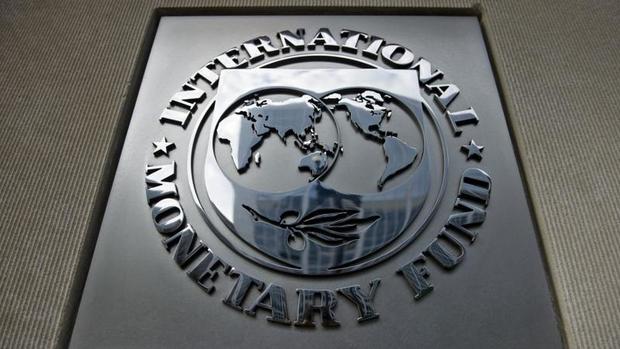 In this file photo taken on June 30, 2015 a logo is seen outside the headquarters of the International Monetary Fund in Washington, DC. (BRENDAN SMIALOWSKI / AFP)
In this file photo taken on June 30, 2015 a logo is seen outside the headquarters of the International Monetary Fund in Washington, DC. (BRENDAN SMIALOWSKI / AFP)
The International Monetary Fund (IMF) sounded a warning over rising global debt levels and proposed reforms to the debt-restructuring process for countries that struggle to meet their obligations, a number that is set to rise as the pandemic batters economies.
With the world’s debt set to approach record levels this year and about half of all low-income countries either in or at risk of debt distress before the health crisis, central banks have cut rates to supply liquidity and institutions such as the IMF, Group of 20 and World Bank have provided emergency and debt-service relief.
With the world’s debt set to approach record levels this year and about half of all low-income countries either in or at risk of debt distress before the health crisis, central banks have cut rates to supply liquidity and institutions such as the IMF, Group of 20 and World Bank have provided emergency and debt-service relief
ALSO READ: Global economic recovery has slowed to a grind
“This support has bought the world some time -- we ought to use it wisely,” Geoffrey Okamoto, the Washington-based IMF’s first deputy managing director, said in a remarks prepared for delivery Thursday. “A pandemic-induced systemic debt crisis cannot be ruled out. The longer the problem is postponed, the worse it will become.”
Addressing growing debt vulnerabilities will be a key theme of the World Bank and IMF’s virtual annual meetings this month, Okamoto said. The Group of 20 nations and Paris Club, under the Debt Service Suspension Initiative, agreed in April to waive billions of dollars in debt repayments until the end of the year from poorer nations. The World Bank says this isn’t enough and wants debt stocks reduced to prevent a bigger fallout. Angola, Argentina, Chad, Ecuador, Lebanon and now Zambia have all either already renegotiated some private-creditor debt or are doing so.
Okamoto’s remarks will be delivered at a conference hosted by the Peterson Institute for International Economics, where IMF representatives are presenting a paper that proposes changes to the architecture for resolving sovereign debt involving private-sector creditors.
ALSO READ: Cooperation key to prevent global recession
Broadly, Okamoto said, the IMF proposes promoting wider adoption of enhanced collective-action clauses in bonds and similar provisions in non-bonded debt.
It also wants increasing debt transparency to address inter-creditor equity concerns and information asymmetries and an agreement on a common restructuring framework by official bilateral creditors.
“The current architecture is also not fully adequate to deal with official bilateral debt,” Okamoto said. “Significant amounts are owed to creditors outside the Paris Club and don’t follow its procedures or have any common restructuring framework. In the past, one debtor country negotiated with one creditor country within the Paris Club framework. Today, it has to speak with several agencies inside that country. Lack of debt transparency adds complication, by creating information asymmetries and inter-creditor equity concerns.”
READ MORE: IMF: Coronavirus crisis 'far from over', more support needed
Since 2014, of the nine debt restructuring cases, a majority were pre-emptive -- that is, pre-default -- while four cases -- Argentina, Barbados, Grenada, and Mozambique -- were post-default, the IMF said in the paper.
In 2021, the IMF will review its own policies relating to sovereign debt, including an exploration of ways to enhance the market based approach, and a re-examination of arrears policies, it said.


